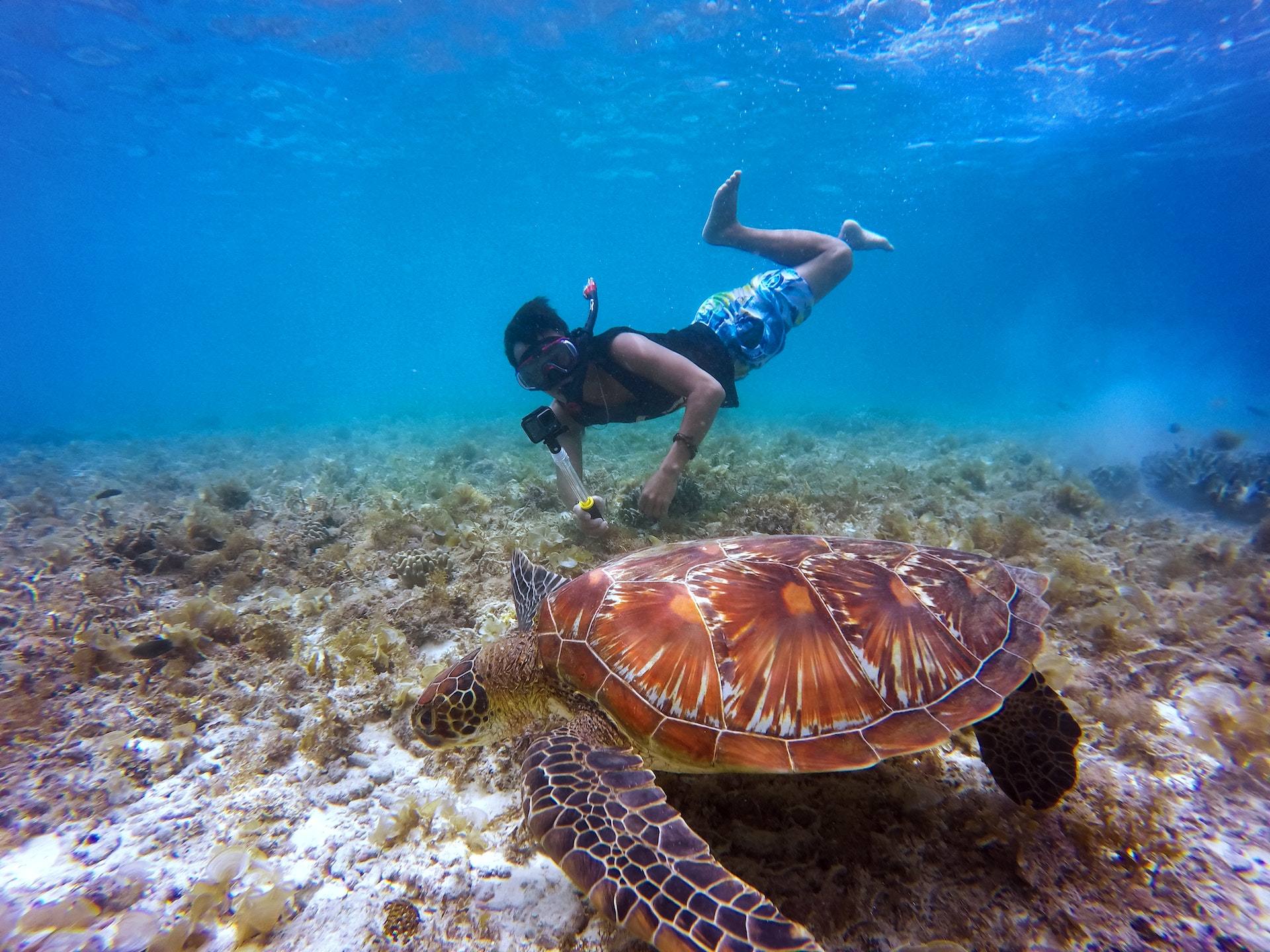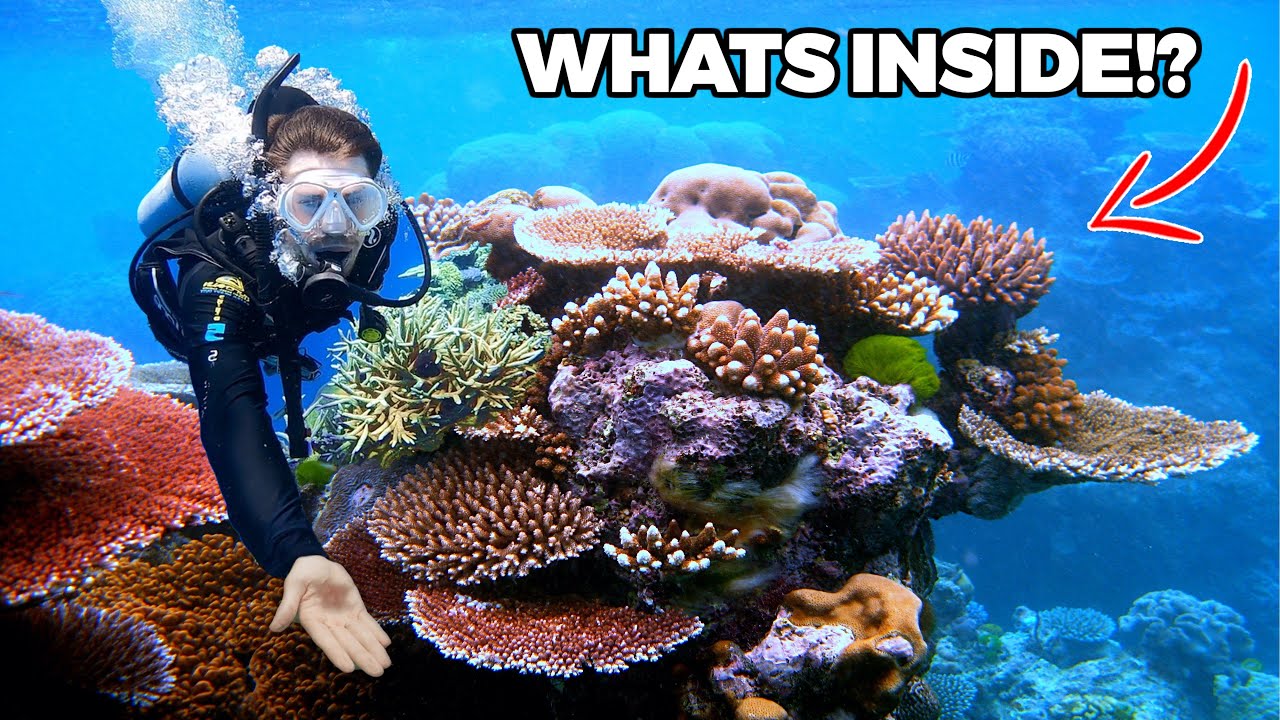Snorkeling And Diving In The Great Barrier Reef - Exploring The Underwater World
Snorkeling and diving in the Great Barrier Reef is an unparalleled experience for nature lovers and adventure seekers alike. The Great Barrier Reef, located off the coast of Australia, is the largest coral reef system in the world and is home to an incredible array of marine life.
Author:Frazer PughReviewer:Iram MartinsJun 09, 202310.8K Shares350.8K Views

Snorkeling and diving in the Great Barrier Reefis an unparalleled experience for nature lovers and adventure seekers alike.
The Great Barrier Reef, located off the coast of Australia, is the largest coral reef system in the world and is home to an incredible array of marine life.
Snorkeling and diving in this natural wonder offer the opportunity to see vibrant coral gardens, mesmerizing sea creatures, and unique underwater formations.
In this article, we will explore everything you need to know about snorkeling and diving in the Great Barrier Reef, from the best time to go to the top spots to visit.
Planning Your Trip
When planning a trip to snorkel or dive in the Great Barrier Reef, it's important to keep a few things in mind to ensure you have the best experience possible. Here are some tips to help you plan your trip:
Choose The Right Time
The Great Barrier Reef can be visited year-round, but the best time to go is between June and October when the weather is dry and sunny, and the water is clear. During this time, the visibility is at its best, and the water is calmest.
Book In Advance
The Great Barrier Reef is a popular destination, so it's important to book your trip well in advance. This is especially important if you plan to visit during the peak season, as tours and accommodations tend to fill up quickly.
Consider Your Level Of Experience
Whether you're a beginner or an experienced diver, there are plenty of options available for you to enjoy the Great Barrier Reef. However, it's important to be honest about your level of experience so that you can choose the right tour or diving package for you.
Choose Your Location
The Great Barrier Reef is vast, and there are plenty of locations to choose from. Some of the most popular locations include Cairns, Port Douglas, and the Whitsunday Islands.
Consider which location will suit your needs best based on your interests and the activities you want to participate in.
Pack Accordingly
When packing for your trip, make sure you bring plenty of sunscreen, a hat, and sunglasses to protect yourself from the sun.
If you plan on snorkeling or diving, you may also want to consider bringing your own equipment, although most tour operators will provide equipment for you.
Don't forget to pack a waterproof camera to capture all the amazing sights you'll see while exploring the Great Barrier Reef.
Snorkeling In The Great Barrier Reef
The Great Barrier Reef is one of the world's most popular snorkeling destinations due to its crystal-clear waters, vibrant marine life, and colorful coral reefs.
If you are planning to snorkel in the Great Barrier Reef, there are a few things you should know to ensure a safe and enjoyable experience.
Choose A Reputable Tour Operator
There are many tour operators that offer snorkeling trips to the Great Barrier Reef, but not all of them are created equal. Do your research and choose a reputable operator that has a good safety record and a commitment to protecting the reef.
Know Your Limits
Snorkeling can be physically demanding, so it's important to know your limits and not push yourself too hard. If you're not a strong swimmer or feel uncomfortable in the water, consider taking a guided tour or using a flotation device.
Use Eco-friendly Sunscreen
Traditional sunscreens contain chemicals that can harm coral and other marine life. To protect the reef, use eco-friendly sunscreen that is free from oxybenzone and octinoxate.
Respect The Reef
The Great Barrier Reef is a fragile ecosystem, so it's important to treat it with respect. Don't touch the coral or disturb the marine life, and follow the guidelines set by your tour operator.
Stay Hydrated
Snorkeling in the sun can be dehydrating, so make sure to drink plenty of water before and after your snorkeling trip. Bring a reusable water bottle to reduce waste.
Be Aware Of The Weather
The weather can have a significant impact on the quality of your snorkeling experience. Avoid snorkeling on windy or rainy days when the water may be rough or visibility may be poor.
Diving In The Great Barrier Reef
Diving in the Great Barrier Reef is an unforgettable experience that draws divers from around the world to explore the incredible underwater world of the world's largest coral reef system.
With over 2,900 individual reefs and 900 islands stretching over 2,300 kilometers, the Great Barrier Reef offers a diverse range of dive sites, including coral gardens, deep drop-offs, and shipwrecks, that cater to divers of all levels.
Dive Sites
The Great Barrier Reef is home to numerous dive sites, each with unique features and attractions. Some of the most popular dive sites include Osprey Reef, Cod Hole, and the Ribbon Reefs.
Osprey Reef is a popular spot for experienced divers due to its deep walls and channels, while the Cod Hole is famous for its giant potato cod that regularly approach divers.
The Ribbon Reefs offer excellent visibility and coral gardens that make for an unforgettable diving experience.
Diving Season
The Great Barrier Reef is a year-round diving destination, but the best time to go diving is between the months of June and November when the weather is dry, and visibility is at its best.
During the summer months, the water temperature can reach up to 30°C (86°F), making it perfect for those who enjoy warm water diving.
Marine Life
The Great Barrier Reef is home to an incredible array of marine life, including over 1,500 species of fish, 400 species of coral, and 6 of the world's 7 species of sea turtles.
Divers can also encounter giant clams, reef sharks, rays, and even dolphins and whales during their dives.
Diving Experience
Diving in the Great Barrier Reef is suitable for all levels of divers, from beginner to experienced.
Many dive operators offer dive courses for those who want to learn to dive, and there are plenty of easy and shallow dive sites suitable for beginners.
More experienced divers can explore deeper sites with drop-offs and currents, which offer more challenging diving experiences.
Conservation
The Great Barrier Reef is a UNESCO World Heritage Site, and the Australian government has put measures in place to protect the reef and its marine life.
Divers can play a part in conservation efforts by being mindful of their impact on the reef and following responsible diving practices.
Diving operators also have codes of conduct to follow to minimize their impact on the environment.

Diving the Great Barrier Reef | Australia's Underwater Paradise
Safety Tips For Snorkeling And Diving In The Great Barrier Reef
When planning a snorkeling or diving trip to the Great Barrier Reef, safety should always be a top priority. While it is an incredibly beautiful and unique destination, there are a number of safety considerations that should be taken into account.
Here are some safety tips to keep in mind:
Choose A Reputable Operator
When selecting a tour operator or dive center, it's important to do your research and choose one with a good safety record. Look for a company that has experienced guides, well-maintained equipment, and appropriate safety protocols in place.
Get Certified
If you plan on scuba diving, make sure you are properly certified and up-to-date on your training. Refresher courses are also available if you haven't dived in a while.
Be Aware Of Your Surroundings
The Great Barrier Reef is a diverse and dynamic environment, so it's important to be aware of your surroundings at all times. Pay attention to weather conditions, currents, and any potential hazards such as jellyfish or sharp rocks.
Use Proper Equipment
Whether you're snorkeling or diving, make sure you are using properly fitting equipment that is in good condition. Always test your gear before entering the water.
Follow The Rules
The Great Barrier Reef is a protected marine park, and there are rules and regulations in place to help protect the delicate ecosystem. Follow all posted signs and instructions from your guide or dive master.
Stay Hydrated
It's important to stay hydrated while snorkeling or diving, especially in the hot Australian sun. Make sure to bring plenty of water and consider wearing a wetsuit to help regulate your body temperature.
Don't Touch The Wildlife
While the marine life in the Great Barrier Reef is incredibly diverse and fascinating, it's important to remember that it is a fragile ecosystem. Do not touch or disturb any wildlife, and keep a safe distance from all creatures.
People Also Ask
How Deep Is The Great Barrier Reef?
The Great Barrier Reef is divided into different zones with varying depths. The shallowest parts of the reef can be as shallow as 1 meter (3 feet), while the deepest parts can reach depths of up to 2,000 meters (6,560 feet).
What Is The Best Time To Snorkel Or Dive In The Great Barrier Reef?
The best time to snorkel or dive in the Great Barrier Reef is during the months of June to October, which is the dry season. During this time, the weather is sunny and the sea is calm, providing excellent visibility for snorkeling and diving.
What Types Of Marine Life Can Be Seen While Snorkeling And Diving In The Great Barrier Reef?
The Great Barrier Reef is home to an abundance of marine life, including colorful fish, sea turtles, sharks, rays, and a variety of coral species. Snorkelers and divers may also have the opportunity to see whales, dolphins, and dugongs in the surrounding waters.
Is It Safe To Snorkel And Dive In The Great Barrier Reef?
Yes, it is generally safe to snorkel and dive in the Great Barrier Reef. However, it is important to follow the guidelines and safety measures provided by your tour operator to ensure a safe and enjoyable experience.
It is also important to be aware of potential hazards, such as strong currents and stinging jellyfish, and to take necessary precautions.
What Is The Difference Between Snorkeling And Diving In The Great Barrier Reef?
Snorkeling involves swimming near the surface of the water while wearing a snorkel mask and fins to observe the underwater world.
Diving, on the other hand, involves wearing specialized equipment to breathe underwater and explore deeper parts of the reef.
Both activities offer unique opportunities to experience the beauty of the Great Barrier Reef.
Final Thoughts
Snorkeling and diving in the Great Barrier Reef is an unforgettable experience that offers an up-close look at one of the world's most incredible natural wonders.
With its vibrant coral reefs, crystal-clear waters, and abundant marine life, the Great Barrier Reef is a must-visit destination for any nature lover or adventure seeker.
Whether you're a beginner or an experienced diver, there are plenty of options available for exploring this magnificent underwater world.
So, start planning your trip and get ready for an unforgettable adventure in the Great Barrier Reef!

Frazer Pugh
Author
Frazer Pugh is a distinguished expert in finance and business, boasting over 6 years of experience. Holding an MBA in Finance from Stanford University, Frazer's credentials underscore his authority and expertise in the field.
With a successful track record in executive roles and as a published author of influential articles on financial strategy, his insights are both deep and practical.
Beyond his professional life, Frazer is an avid traveler and culinary enthusiast, drawing inspiration from diverse cultures and cuisines.
His commitment to delivering trustworthy analysis and actionable advice reflects his dedication to shaping the world of finance and business, making a significant impact through his work.

Iram Martins
Reviewer
Iram Martins is a seasoned travel writer and explorer with over a decade of experience in uncovering the world's hidden gems. Holding a Bachelor's degree in Tourism Management from the University of Lisbon, Iram's credentials highlight his authority in the realm of travel.
As an author of numerous travel guides and articles for top travel publications, his writing is celebrated for its vivid descriptions and practical insights.
Iram’s passion for cultural immersion and off-the-beaten-path adventures shines through in his work, captivating readers and inspiring wanderlust.
Outside of his writing pursuits, Iram enjoys learning new languages, reviewing films and TV shows, writing about celebrity lifestyles, and attending cultural festivals.
Latest Articles
Popular Articles